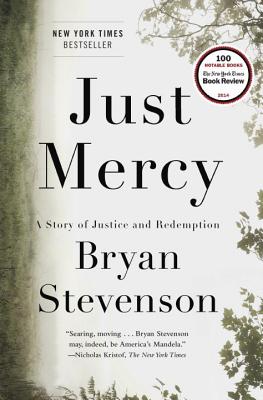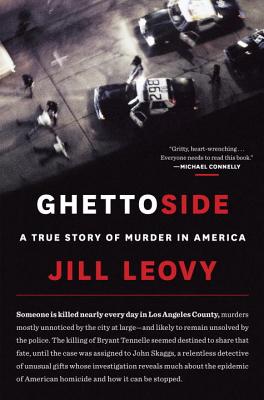There are lots of narratives that make us feel comfortable, that reinforce the way the world works or tell us that institutions work the way they’re designed to work. While there’s nothing wrong with reading those comfortable stories – in fiction or nonfiction – I also like finding books that challenge my worldview in important ways.
In this post I wanted to write about two books – one that pushes readers to acknowledge uncomfortable narratives, and another that relies on a comfortable story in service of an uncomfortable argument.
 The first book, one of the best I’m going to read this year, is Just Mercy by Bryan Stevenson.
The first book, one of the best I’m going to read this year, is Just Mercy by Bryan Stevenson.
As a young lawyer, Stevenson helped found the Equal Justice Initiative, an organization focused on providing legal support for those who need it most. Based in Monroeville, Alabama (hometown of Harper Lee, setting of To Kill a Mockingbird), many of EJI’s early cases focused on people wrongly placed on the death penalty. The book focuses strongly one of of those cases, a man named Walter McMillian wrongly accused of murder. As Stevenson shares the long, difficult journey to get Walter off of death row, he also writes movingly about cases that were not successful and about the biases and unfairness inherent in our criminal justice system.
Stevenson is a clear, persuasive, honest writer – this book really is a must read for anyone interested in issues of race, justice and the death penalty. There were several instances in this book where Stevenson moved me to tears with his stories. It’s uncomfortable to acknowledge that a system – and some of the people we task with making it fair and just – can protect people like me while truly hurting others who are not so fortunate. And the system is set up to make correcting those wrongs extremely difficult, if not impossible, without the help of organizations like EJI.
 The second book I want to talk about is one that gave me more complicated feelings, Ghettoside by Jill Leovy.
The second book I want to talk about is one that gave me more complicated feelings, Ghettoside by Jill Leovy.
The book opens with this fact: black men compose about 6 percent of our population, but are victims in almost 40 percent of homicides. In digging down to find the story behind that statistic, Leovy sets up a premise that seems contradictory to some of what Stevenson suggests. She argues that when “the criminal justice system fails to respond vigorously to violent injury and death, homicide becomes endemic.”
In addition to being overly prosecuted for minor crimes, black men in Los Angeles are further punished by the system because the system doesn’t work hard enough to solve their murders and prosecute their killers. That’s an intriguing premise that, on the whole, I think Leovy successfully manages to support. And Ghettoside is a truly engaging read – the reporting that went into this book is incredible, and Leovy is a gifted storyteller.
But I also worry that the story is engaging because it centers on a narrative that’s comfortable – heroic detectives with above average talent who work harder than everyone else to solve cases. The case of the story is the murder of a young black man who also happens to be a police officer’s son. He’s unquestionably a good kid and, by virtue of his family, a person whose murder is going to be investigated to the full extent possible. Leovy uses the case to show what it takes to solve “ghettoside” murders that many consider unsolvable, but on the whole it’s a fairly traditional, comfortable, true crime narrative.
The uncomfortable narrative – the reasons other police officers don’t take ghettoside murders seriously and the biases they bring to policing neighborhoods – feels glossed over. Instead of interrogating deeply the reasons that policing as a whole isn’t done well, Leovy seems to give a lot of the officers and detectives a pass while holding up the work of a few. That’s not the full story, and not the story that is going to make readers think more deeply. I liked reading the book, but I didn’t feel challenged by where it ultimately went.
If you’re curious for more thoughts on Ghettoside, I highly encourage you to check out this post from Shannon at River City Reading. She looks Ghettoside in relation to another big book on race and justice, Between the World and Me by Ta-Nehisi Coates, pulling out some similar problematic aspects of how the narrative is structured. The comments are particularly great as well, so make sure you head over there.
Whew, that post got long and was probably a little rambly. I’d love to hear your thoughts on comfortable versus uncomfortable narratives, and about books you’ve read that challenge ideas about race and justice.

Comments on this entry are closed.
I absolutely agree with you on both. Just Mercy is one of the best pieces of nonfiction I’ve read, and it’s a book I wish I could put in everyone’s hands. I’m thrilled it’s being made into a movie because I know more people will be reading it.
I totally think you’re right about the comfort level of Ghettoside, and I think I would have been fine with that had it not been for books like Just Mercy and Between the World and Me. The interrogation scenes in Ghettoside took on a new light after reading Just Mercy, not because the detectives were in the wrong, but it was so clear how false confessions could be the result in a different situation. Just a completely different perspective.
I just saw that movie news this week — so awesome! Michael B. Jordan will be so great.
The more I think about Ghettoside, the more I’m seeing that it’s a true crime book that touches on race issues. Just Mercy, and Between the World and Me, are books on race deeply connected to issues of crime and justice. It’s just two different approaches that are going to be more or less satisfying depending on what topic is most interesting to you in the moment.
Both books sound like important reads and I don’t own either one of them. I must remedy that.
These aren’t books I would be likely to pick up on my own, but you make such interesting points about them that my interest is definitely piqued, Kim. I will admit to reading what is comfortable most of the time, but I do want to challenge my worldview a bit and expand those reading borders.
I so recommend getting Just Mercy, it’s an incredible read. I think it’s out in paperback later this month as well 🙂
Very much enjoyed Shannon’s post yesterday. I’ve begun Ghettoside and am on the fence about whether to continue, as I more often gravitate toward books like Just Mercy, The New Jim Crow, etc. that really let the social and structural determinants of incarceration show rather than true crime-y ones. It’s entirely possible I just expected something that this book isn’t and wasn’t trying to be. I may put it on the back-burner and come back to it.
I think that might be part of the problem for me, as well, thinking Ghettoside would be one thing and seeing it’s another. It’s much more a true crime book, with touches of race commentary… rather than a book on race and justice.
Great post, Kim! This solidifies my decision to pass on Ghettoside, but now I have to check out Just Mercy.
I haven’t read either of these books, but I think it’s so, so important when you’re writing about marginalized groups to lift up voices from their groups, which it sounds like Jill Levy isn’t always great at in Ghettoside. And also, yeah, like you say, not just to talk about solutions, but to dig into why those solutions aren’t being pursued systemically (and also, of course, how the systemic problems arose in the first place).
Yes, exactly. She gets a bit at some of the systemic problems in an agency like the LAPD — particularly how talented detectives are moved out of troubled areas as part of the promotion process — but didn’t dig enough into some of the basic problems in policing those areas.
Really thoughtful post, Kim. Just Mercy is a book that hadn’t really been on my radar, but between you and Shannon, I really want to read it now.
It’s so good! Read it!
Thanks for adding both of them to my TBR!
Great post! I haven’t read either of these books yet, but I’ve also been challenging myself to read uncomfortable narratives and learn more about social issues. I really want to read Just Mercy, but I think I’ll skip Ghettoside; it’s a shame that it kind of glosses over some of the more important issues when it comes to social justice.
On of the reason Ghettoside is so good is that the author does point out the problem in the hood. The residents know who the murderers are yet they won’t cooperate with police. The statistic that jump off the chart was her compare and contrast with Latinos in the same geographic area and some economic straits. Yet the clearance rate is much higher in Latino communities. They want the killers caught. The problem exist with a sub culture that has not grown to accept and live by modern rules . That is there are systems inlace to protect but you need to participate rather than grouse about past injustice. LAPD does an amazing job considering what they are up against.